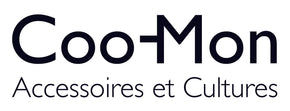Dressing eco-friendly
Adopting a responsible consumption mode contributes to the preservation of the environment and the promotion of ethical commercial practices. There is a growing interest among households, as evidenced by the popularization of electric cars and the production of organic foods. But in the textile and fashion industry, how is this change reflected? How can we dress well while preserving our environment? What means does the Coo-Mon brand implement to limit its environmental impact? We open the doors of our workshop to you.
1. What is eco-responsible fashion?
Eco-friendly consumption refers to a consumption mode where consumers consider the environmental and social impact of the products purchased. It aims to limit the ecological impact and damage caused to the planet by promoting the purchase and use of durable, reusable, and recyclable products. It also encourages consumers to choose local, organic, and fair-trade products, as well as to reduce their energy and water consumption.
Eco-friendly consumption also involves reducing waste by promoting the reuse and recycling of products. It is part of a sustainable development approach aimed at preserving natural resources for future generations.
Based on this definition, the same principles are transcribed to the clothing sector. Eco-friendly fashion affects every stage of the garment's life cycle, from the factory to the wardrobe:
- sourcing and composition of raw materials
- mode of production of fabrics, clothing, and accessories
- packaging and conditioning
- communications and marketing
- transport and logistics operations
- involved human resources
Eco-friendly fashion is therefore a set of measures taken by the company, its partners, and its committed customers to minimize the negative impact on the environment.
2. Eco-responsible fashion at Coo-Mon
At Coo-Mon, we have adopted certain practices to contribute, at our level, to the preservation of the environment and the well-being of consumers and workers.
2.1. Recycling of materials
Recycling has become one of the cornerstones of our production system. Indeed, we use and optimize fabric and leather scraps as much as possible. For example, our new Tote bags have a recycled leather piece as a closure, and the brown and black model was made from a recycled boubou.
Our reusable shopping and market bags are mostly made from recycled African print.
Similarly, our scarf with its leather piece, also recycled. Many of our crossed headbands and scrunchies are made from recycled fabrics or our fabric scraps.
2.2. Local production
Our accessories are 100% handmade in. Besides the exotic fabrics that we must bring from elsewhere for their authenticity, plain textiles are purchased locally.
2.3. Optimization of our patterns
Our new patterns are designed in such a way that the cut is so precise that nearly 95% of the base material is used, thus avoiding fabric waste.
3. Other eco-responsible advances
Other eco-friendly trends are also emerging within the clothing industry. The ultimate goal is to significantly reduce the negative impact of fashion on the environment.
In the future, Coo-Mon wishes to develop its practices by taking inspiration from the best practices in the fashion industry.
3.1. Use of sustainable materials
Organic cotton, linen, hemp, Tencel, and ecological silk are considered more durable and environmentally friendly than the materials widely used in fast fashion. It is true that organic fabrics cost more, but they are of higher quality, last longer, and have a lower impact on the environment.
3.2. Material recycling techniques
These include all methods that transform used materials into new products. Recycling technologies include sorting, collection, decomposition, and transformation of materials. Used clothing can be shredded and reduced to fibers to be used in making new accessories, clothing, or even furniture. Items that are still in good condition can simply be resold on applications such as Vinted and in second-hand shops, or given to those in need.
3.4. Environmentally friendly manufacturing techniques
It is known that the textile industry is one of the most polluting that exists. Nevertheless, there are alternative and less harmful solutions :
- Eco-friendly dyeing uses natural and plant-based dyes to color textiles, thereby reducing the amount of harmful chemicals used in the dyeing process.
- Hand weaving is a traditional process that makes it possible to produce textiles in a traditional way, without the use of expensive energy-consuming machinery.
- Natural finishing involves using natural products such as beeswax, carnauba wax and candelilla wax, instead of synthetic chemicals.
3.5. The use of eco-friendly packaging
Biodegradable or recyclable packaging enables products to be packaged more responsibly:
- Recycled cardboard boxes
- Kraft paper bags
- Vegetable cellulose packaging
- Reusable burlap bags
Packaging reduction must also be strategically considered to ensure product protection while minimizing environmental impact. It is important to balance the need to protect products during transport and sale, while minimizing the use of packaging materials.
At Coo-Mon, orders are shipped in compostable envelopes. And the paper bags we use are made of recycled paper.
3.6. Local manufacturing
Local manufacturing remains the most effective way to anchor oneself in an eco-responsible approach. Sourcing raw materials locally helps support the local economy while drastically reducing the carbon footprint that importing foreign products would entail. Furthermore, hiring labour in the region reduces the unemployment rate.
3.7. The repair
Repair is also a way to extend the life of your clothing and accessories. This means that you will be able to use them for longer and they will not end up in waste too soon.
You can now have your defective or torn Coo-Mon accessories repaired free of charge at the workshop. To benefit from this free service, simply contact us to make an appointment.
Respect for the environment and for humanity are values dear to Coo-mon. We are continuing our efforts to improve our manufacturing processes to make Coo-Mon the ethical brand of our dreams.
